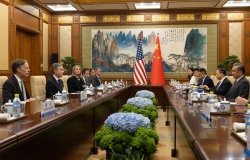Combating Human Trafficking in Asia: A Strategy for Action
Amihan Abueva, Coordinator for Southeast Asia, Asia ACTs Against Child Trafficking; Thetis Mangahas, ILO International Program on the Elimination of Child Labor, Mekong Sub-Regional Project to Combat Trafficking in Children and Women; Shirley Seng, Kachin Women's Association, Thailand; Mark Taylor, Office to Monitor and Combat Trafficking in Persons, United States Department of State; Melanne Verveer (moderator), Chair, Vital Voices Global Partnership
Overview
An Asia Program Event
Co-sponsored with the Asia Society
Human trafficking is an "international scourge," declared Melanne Verveer, moderator of an Asia Program event on human trafficking in Asia co-sponsored with the Asia Society. Asserting that it is transnational crime's second most profitable business, Verveer estimated that nearly one million people—maybe more—are trafficked across national borders into "modern-day slavery," including tens of thousands sent to the United States. Victims, initially seduced by promises of jobs and security, end up wallowing "in virtual captivity." Human trafficking poses challenges for health, national security, and law enforcement. Efforts to combat it, Verveer posited, must adapt a "three ‘p'" approach—prevention, protection, and prosecution. She cited one of the first legal frameworks of the global anti-trafficking movement—the United Nations' Protocol to Prevent, Suppress and Punish Trafficking in Persons—yet noted that trafficking is largely unconstrained by law.
Trafficking is of particular concern in Asia. The event's first panel, drawing on the experience of Asia-based experts, addressed labor and sex trafficking. Thetis Mangahas described labor conditions in the Greater Mekong Region (GMR), comprising Burma, Cambodia, southwestern China, Laos, Thailand, and Vietnam. Economic disparities and poverty have fueled "flows" of human movement toward areas of global investment. This constant stream of economic activity and migration makes trafficking—particularly in labor—difficult to identify in the GMR. Yet it flourishes, especially in workplaces often not covered by fair labor policies. Mangahas recommended the adoption of an inclusive anti-trafficking policy framework that employs civil society and business owner participation and that focuses on underlying causes. Current policies, she argued, overemphasize law enforcement. Shirley Seng reported on the plight of oppressed, marginalized women in the impoverished Kachin area of Burma. Lured by promises of jobs in China, Kachin teenage girls with little chance of education or employment at home are trafficked out of Burma. Many girls simply "disappear" along the Burma-China border. Others have been transported across China and forced to become wives and to bear children, or to toil in brothels and massage parlors. Government responses to trafficking in China and Burma are inadequate, Seng declared, and she urged the international community's involvement.
What has the international community done? The second panel addressed the international community's response to human trafficking. The U.S. State Department's Mark Taylor explained current U.S. policy, reiterating the "three ‘p'" strategy and noting the Department's annual publication of the Trafficking in Persons (TIP) Report. The publication employs a four-tier ranking system to judge whether nations are upholding appropriate standards in fighting trafficking; those on the lower tiers face the prospect of U.S. sanctions. These policies, Taylor stated, aim not to shame offending governments but instead to foster reforms and victims' protections. He cited success stories in Japan, which now has an anti-trafficking law, and progress in Thailand and Bangladesh. Yet he acknowledged continued challenges. Amihan V. Abueva described recent anti-trafficking initiatives in Southeast Asia. The Philippines has passed legislation authorizing penalties for trafficking, while the country's Department of Justice has recently appointed a prosecutor with a child trafficking portfolio. Advocates in Southeast Asia are now at work on a set of Asian guidelines for human trafficking. And December 12 is now commemorated as an international day against trafficking. Abueva implored the international community to adapt a broad policy framework that takes into account poor education, armed conflict, and struggling economies—all of which can breed the conditions for human trafficking.
Drafted by Michael Kugelman, Asia Program Assistant
Robert M. Hathaway, Director, Asia Program, Ph: (202) 691-4020
Hosted By

Indo-Pacific Program
The Indo-Pacific Program promotes policy debate and intellectual discussions on US interests in the Asia-Pacific as well as political, economic, security, and social issues relating to the world’s most populous and economically dynamic region. Read more
Thank you for your interest in this event. Please send any feedback or questions to our Events staff.










